- Home
- Robert Harris
Archangel Page 4
Archangel Read online
Page 4
As always, even now, even as he lay sprawled on the floor of a Moscow bathroom, there was a part of him that remained mercilessly sober, like the wounded captain on the bridge of a stricken ship, calling calmly through the smoke of battle for damage assessments. This was the part of him which concluded that, bad as he felt, he had – amazingly – sometimes felt worse. And this was the part of him that also heard, beyond the dusty thump of his pulse, the creak of a footstep and the click of a door being quietly closed.
Kelso set his jaw and rose, by force of will, through all the stages of human evolution – from the slime of the floor, to his hands and knees, to a kind of shuffling, simian crouch – and propelled himself into the empty bedroom. Grey light seeped through thin orange curtains and lit the detritus of the night. The sour reek of spilled booze and stale smoke made his stomach coil. Still – and there was heroism as well as desperation in the effort – he headed for the door.
‘Papu Gerasimovich! Wait!’
The corridor was dim and deserted. From the end of it, around the corner, came the ping of an arriving elevator. Wincing, Kelso loped towards it, arriving just in time to see the doors close. He tried to prise them open with his fingers, shouting into the crevice for Rapava to come back. He punched the call button with the heel of his hand a few times, but nothing happened so he took the stairs. He got as far as the twenty-first floor before he acknowledged he was beaten. He stopped on the landing and summoned the express elevator, and stood there waiting for it, leaning against the wall, breathless, nauseous, with a knife behind his eyes. The car was a long time coming and when, at last, it did arrive, it promptly took him back up the two floors he had just run down. The doors slid open mockingly on to the empty passage.
By the time Kelso reached ground level, his ears popping from the speed of his descent, Rapava was gone. In the marble vault of the Ukraina’s reception there was nobody about except for a babushka, hoovering ash from the red carpet, and a platinum-blonde hooker with a fake sable curled over her shoulders, arguing with a security man. As he made for the entrance he was aware that all three had stopped what they were doing and were staring at him. He put his hand to his forehead. He was dripping with sweat.
It was cold outside and barely light. A sharp October morning. A damp chill rising off the river. Yet already the rush-hour traffic was beginning to build along the Kutuzovskiy Prospekt, backing up from the Kalininskiy Bridge. He walked on for a while until he came to the main road, and there he stood for a minute or two, shivering in his shirtsleeves. There was no sign of Rapava. Along the sidewalk to his right, an old grey dog, big and half-starved, went slouching past the heavy buildings, heading east, towards the waking city.
Part One
Moscow
‘To choose one’s victims, to prepare one’s plans minutely, to slake an implacable vengeance, and then to go to bed … there is nothing sweeter in the world.’
J. V. Stalin in conversation with Kamenev and Dzerzhinsky
Chapter One
OLGA KOMAROVA OF the Russian Archive Service, Rosarkhiv, wielding a collapsible pink umbrella, prodded and shooed her distinguished charges across the Ukraina’s lobby towards the revolving door. It was an old door, of heavy wood and glass, too narrow to cope with more than one body at a time, so the scholars formed a line in the dim light, like parachutists over a target zone, and as they passed her, Olga touched each one lightly on the shoulder with her umbrella, counting them off one by one as they were propelled into the freezing Moscow air.
Franklin Adelman of Yale went first, as befitted his age and status, then Moldenhauer of the Bundesarchiv in Koblenz, with his absurd double-doctorate – Doctor Doctor Karl-bloody-Moldenhauer – then the neo-Marxists, Enrico Banfi of Milan and Eric Chambers of the LSE, then the great cold warrior, Phil Duberstein of NYU, then Ivo Godelier of the Ecole Normale Superieure, followed by glum Dave Richards of St Antony’s, Oxford – another Sovietologist whose world was rubble – then Velma Byrd of the US National Archive, then Alastair Findlay of Edinburgh’s Department of War Studies, who still thought the sun shone out of Comrade Stalin’s arse, then Arthur Saunders of Stanford, and finally – the man whose lateness had kept them waiting in the lobby for an extra five minutes – Dr C. R. A. Kelso, commonly known as Fluke.
The door banged hard against his heels. Outside the weather had worsened. It was trying to snow. Tiny flakes, as hard as grit, came whipping across the wide grey concourse and spattered his face and hair. At the bottom of the flight of steps, shuddering in a cloud of its own white fumes, was a dilapidated bus, waiting to take them to the symposium. Kelso stopped to light a cigarette.
‘Jesus, Fluke,’ called Adelman, cheerfully, ‘you look just awful.’
Kelso raised a fragile hand in acknowledgement. He could see a huddle of taxi drivers in quilted jackets stamping their feet against the cold. Workmen were struggling to lift a roll of tin off the back of a lorry. One Korean businessman in a fur hat was photographing a group of twenty others, similarly dressed. But of Papu Rapava: no sign.
‘Doctor Kelso, please, we are waiting again.’ The umbrella wagged at him in reproof. He transferred the cigarette to the corner of his mouth, hitched his bag up on to his shoulder and moved towards the bus.
‘A battered Byron’ was how one Sunday newspaper had described him when he had resigned his Oxford lectureship and moved to New York, and the description wasn’t a bad one – curly black hair too long and thick for neatness, a moist, expressive mouth, pale cheeks and the glow of a certain reputation – if Byron hadn’t died on Missolonghi but had spent the next ten years drinking whisky, smoking, staying indoors and resolutely avoiding all exercise, he, too, might have come to look a little like Fluke Kelso.
He was wearing what he always wore: a faded dark blue shirt of heavy cotton with the top button undone, a loosely knotted and vaguely stained dark tie, a black corduroy suit with a black leather belt over which his stomach bulged slightly, red cotton handkerchief in his breast pocket, scuffed boots of brown suede, an old blue raincoat. This was Kelso’s uniform, unvaried for twenty years.
‘Boy,’ Rapava had called him, and the word was both absurd for a middle-aged man and yet oddly accurate. Boy.
The heater was going full blast. Nobody was saying much. He sat on his own near the back of the bus and rubbed at the wet glass as they jolted up the slip-road to join the traffic on the bridge. Across the aisle, Saunders made an ostentatious display of batting Kelso’s smoke away. Beneath them, in the filthy waters of the Moskva, a dredger with a crane mounted on its aft deck beat sluggishly upstream.
He nearly hadn’t come to Russia. That was the joke of it. He knew well enough what it would be like: the bad food, the stale gossip, the sheer bloody tedium of academic life – of more and more being said about less and less – that was one reason why he had chucked in Oxford and gone to live in New York. But somehow the books he was supposed to write had not quite materialised. And besides, he never could resist the lure of Moscow. Even now, sitting on a stale bus in the Wednesday rush-hour, he could feel the charge of history beyond the muddy glass: in the dark and renamed streets, the vast apartment blocks, the toppled statues. It was stronger here than anywhere he knew; stronger even than in Berlin. That was what always drew him back to Moscow – the way history hung in the air between the blackened buildings like sulphur after a lightning-strike.
‘You think you know it all about Comrade Stalin, don’t you boy? Well, let me tell you: you don’t know fuck.’
Kelso had already delivered his short paper, on Stalin and the archives, at the end of the previous day: delivered it in his trademark style – without notes, with one hand in his pocket, extempore, provocative. His Russian hosts had looked gratifyingly shifty. A couple of people had even walked out. So, all in all, a triumph.
Afterwards, finding himself predictably alone, he had decided to walk back to the Ukraina. It was a long walk, and it was getting dark, but he needed the air. And at some point – he could
n’t remember where: maybe it was in one of the back streets behind the Institute, or maybe it was later, along the Noviy Arbat – but at some point he had realised he was being followed. It was nothing tangible, just a fleeting impression of something seen too often – the flash of a coat, perhaps, or the shape of a head – but Kelso had been in Moscow often enough in the bad old days to know that you were seldom wrong about these things. You always knew if a film was out of synch, however fractionally; you always knew if someone fancied you, however improbably; and you always knew when someone was on your tail.
He had just stepped into his hotel room and was contemplating some primary research in the mini-bar when the front desk had called up to say there was a man in the lobby who wanted to see him. Who? He wouldn’t give his name, sir. But he was most insistent and he wouldn’t leave. So Kelso had gone down, reluctantly, and found Papu Rapava sitting on one of the Ukraina’s imitation leather sofas, staring straight ahead, in his papery blue suit, his wrists and ankles sticking out as thin as broomsticks.
‘You think you know it all about Comrade Stalin, don’t you, boy …?’ Those had been his opening words.
And that was the moment that Kelso had realised where he had first seen the old man: at the symposium, in the front row of the public seats, listening intently to the simultaneous translation over his headphones, muttering in violent disagreement at any hostile mention of J. V. Stalin.
Who are you? thought Kelso, staring out of the grimy window. Fantasist? Con man? The answer to a prayer?
*
THE symposium was only scheduled to last one more day – for which relief, in Kelso’s view, much thanks. It was being held in the Institute of Marxism–Leninism, an orthodox temple of grey concrete, consecrated in the Brezhnev years, with Marx, Engels and Lenin in gigantic bas-relief above the pillared entrance. The ground floor had been leased to a private bank, since gone bust, which added to the air of dereliction.
On the opposite side of the street, watched by a couple of bored-looking militia men, a small demonstration was in progress – maybe a hundred people, mostly elderly, but with a few youths in black berets and leather jackets. It was the usual mixture of fanatics and grudge-holders – Marxists, nationalists, anti-semites. Crimson flags bearing the hammer and sickle hung beside black flags embroidered with the tsarist eagle. One old lady carried a picture of Stalin; another sold cassettes of SS marching songs. An elderly man with an umbrella held over him was addressing the crowd through a bullhorn, his voice a distorted, metallic rant. Stewards were handing out a free newspaper called Aurora.
‘Take no notice,’ instructed Olga Komarova, standing up beside the driver. She tapped the side of her head. ‘These are crazy people. Red fascists.’
‘What’s he saying?’ demanded Duberstein, who was considered a world authority on Soviet communism even though he had never quite got round to learning Russian.
‘He’s talking about how the Hoover Institution tried to buy the Party archive for five million bucks,’ said Adelman. ‘He says we’re trying to steal their history.’
Duberstein sniggered. ‘Who’d want to steal their goddamned history?’ He tapped on the window with his signet ring. ‘Say, isn’t that a TV crew?’
The sight of a camera caused a predictable, wistful stir among the academics.
‘I believe so …’
‘How very flattering …’
‘What’s the name,’ said Adelman, ‘of the fellow who runs Aurora? Is it still the same one?’ He twisted round in his seat and called up the aisle. ‘Fluke – you should know. What’s his name? Old KGB –’
‘Mamantov,’ said Kelso. The driver braked hard and he had to swallow to stop himself being sick. ‘Vladimir Mamantov.’
‘Crazy people,’ repeated Olga, bracing herself as they came to a stop. ‘I apologise on behalf of Rosarkhiv. They are not representative. Follow me, please. Ignore them.’
They filed off the bus and a television cameraman filmed them as they trudged across the asphalt forecourt, past a couple of drooping, silvery fir trees, pursued by jeers.
Fluke Kelso moved delicately at the rear of the column, nursing his hangover, holding his head at a careful angle, as if he was balancing a pitcher of water. A pimply youth in wire spectacles thrust a copy of Aurora at him and Kelso got a quick glimpse of the front page – a cartoon caricature of Zionist conspirators and a weird cabalistic symbol that was something between a swastika and a red cross – before he rammed it back in the young man’s chest. The demonstrators jeered.
A thermometer on the wall outside the entrance read minus one. The old nameplate had been taken down and a new one had been screwed in its place, but it didn’t quite fit so you could tell that the building had been renamed. It now proclaimed itself ‘The Russian Centre for the Preservation and Study of Documents Relating to Modern History’.
Once again, Kelso lingered behind after the others had gone in, squinting at the hate-filled faces across the street. There were a lot of old men of a similar age, pinched and raw-cheeked in the cold, but Rapava wasn’t among them. He turned away and moved inside, into the shadowy lobby, where he gave his coat and bag to the cloakroom attendant, before passing beneath the familiar statue of Lenin towards the lecture hall.
Another day began.
There were ninety-one delegates at the symposium and almost all of them seemed to be crowded into the small ante-room where coffee was being served. He collected his cup and lit another cigarette.
‘Who’s up first?’ said a voice behind him. It was Adelman.
‘Askenov, I think. On the microfilm project.’
Adelman groaned. He was a Bostonian, in his seventies, at that twilight stage in his career when most of life seemed to be spent in airplanes or foreign hotels: symposia, conferences, honorary degrees – Duberstein maintained that Adelman had given up pursuing history in favour of collecting air miles. But Kelso didn’t begrudge him his honours. He was good. And brave. It had taken courage to write his kind of books, thirty years ago, on the Famine and the Terror, when every other useful idiot in academia was screeching for détente.
‘Listen, Frank,’ he said, ‘I’m sorry about dinner.’
‘Forget it. You got a better offer?’
‘Kind of.’
The refreshment room was at the back of the Institute and looked out on to an inner courtyard, in the centre of which, dumped on their sides amid the weeds, were a pair of statues, of Marx and Engels – a couple of Victorian gentlemen taking time off from the long march of history for a morning doze.
‘They don’t mind taking down those two,’ said Adelman. ‘That’s easy. They’re foreigners. And one of them’s a Jew. It’s when they take down Lenin – that’s when you’ll know the place has really changed.’
Kelso took another sip of coffee. ‘A man came to see me last night.’
‘A man? I’m disappointed.’
‘Could I ask your advice, Frank?’
Adelman shrugged. ‘Go ahead.’
‘In private?’
ADELMAN stroked his chin. ‘You got his name, this guy?’
‘Of course I got his name.’
‘His real name?’
‘How do I know if it’s his real name?’
‘His address, then? You got his address?’
‘No, Frank, I didn’t get his address. But he did leave these.’
Adelman took off his glasses and peered closely at the book of matches. ‘It’s a set-up,’ he said at last, handing them back. ‘I wouldn’t touch it. Whoever heard of a bar called “Robotnik”, anyhow? “Worker”? Sounds phoney to me.’
‘But if it was a set-up,’ said Kelso, weighing the match-book in his palm, ‘why would he run away?’
‘Obviously, because he doesn’t want it to look like a set-up. He wants you to have to work at it – track him down, persuade him to help you. That’s the psychology of a clever fraud – the victims wind up doing so much chasing around, they start wanting to believe it’s true. Rem
ember the Hitler diaries. Either that or he’s a lunatic.’
‘He was very convincing.’
‘Lunatics often are. Or it’s a practical joke. Someone wants to make you look a fool. Have you thought of that? You’re not exactly the most popular kid in the school.’
Kelso glanced up the corridor towards the lecture hall. It wasn’t a bad theory. There were plenty in there who didn’t like him. He had appeared on too many television programmes, knocked out too many newspaper columns, reviewed too many of their useless books. Saunders was loitering at the corner, pretending to talk to Moldenhauer, both men obviously straining to overhear what he was saying to Adelman. (Saunders had complained bitterly after Kelso’s paper about his ‘subjectivity’: ‘Why was he even invited, that’s what one wants to know. One had been given to understand this was a symposium for serious scholars …’)
‘They don’t have the wit,’ he said. He gave them a wave and was pleased to see them duck out of sight. ‘Or the imagination.’
‘You sure have a genius for making enemies.’
‘Ah well. You know what they say: more enemies, more honour.’
Adelman smiled and opened his mouth to say something, but then seemed to think better of it. ‘How’s Margaret, dare one ask?’
‘Who? Oh, you mean poor Margaret? She’s fine, thank you. Fine and feisty. According to the lawyers.’
‘And the boys?’
‘Entering the springtime of their adolescence.’
‘And the book? That’s been a while. How much of this new book have you actually written?’
‘I’m writing it.’
‘Two hundred pages? A hundred?’
‘What is this, Frank?’
‘How many pages?’
‘I don’t know.’ Kelso licked his dry lips. Almost unbelievably, he realised he could do with a drink. ‘A hundred maybe.’ He had a vision of a blank grey screen, a cursor flashing weakly, like a pulse on a life-support machine begging to be switched off. He hadn’t written a word. ‘Listen, Frank, there could be something in this, couldn’t there? Stalin was a hoarder, don’t forget. Didn’t Khrushchev find some letter in a secret compartment in the old man’s desk after he died?’ He rubbed his aching head. ‘That letter from Lenin, complaining about Stalin’s treatment of his wife? And then there was that list of the Politburo, with crosses against everyone he was planning to purge. And his library – remember his library? He made notes in almost every book.’

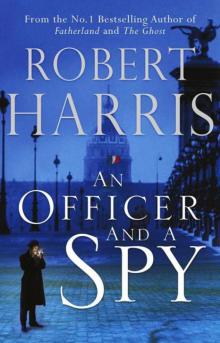 An Officer and a Spy
An Officer and a Spy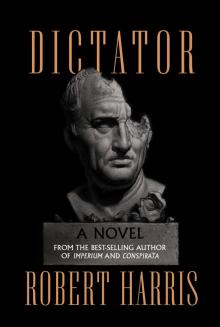 Dictator
Dictator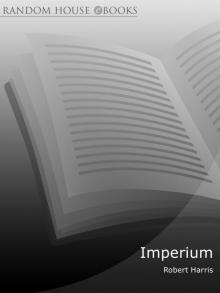 Imperium:
Imperium: Enigma
Enigma Fatherland
Fatherland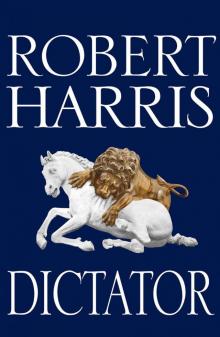 Dictator:
Dictator: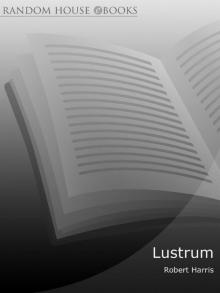 Lustrum
Lustrum Archangel
Archangel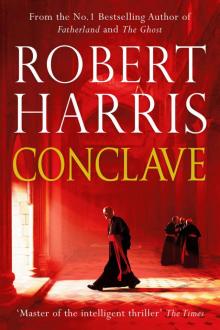 Conclave
Conclave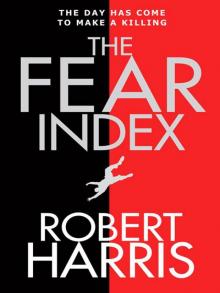 The Fear Index
The Fear Index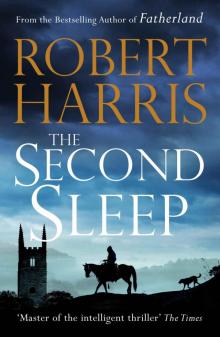 The Second Sleep
The Second Sleep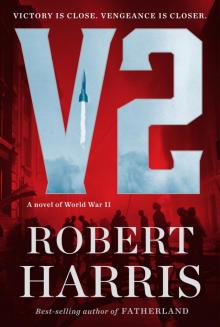 V2
V2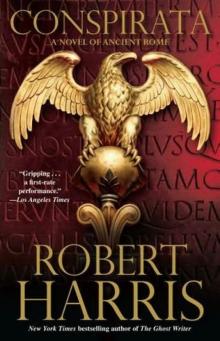 Lustrum c-2
Lustrum c-2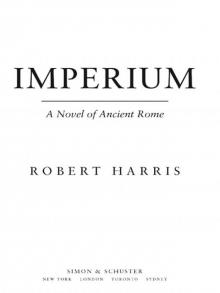 Imperium
Imperium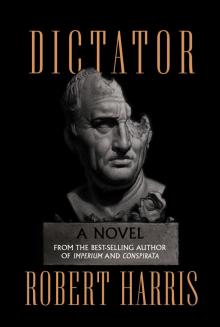 The Dictator
The Dictator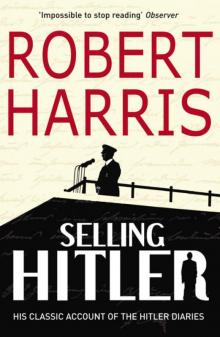 Selling Hitler
Selling Hitler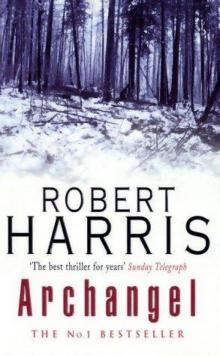 Archangel (Mass Market Paperback)
Archangel (Mass Market Paperback)